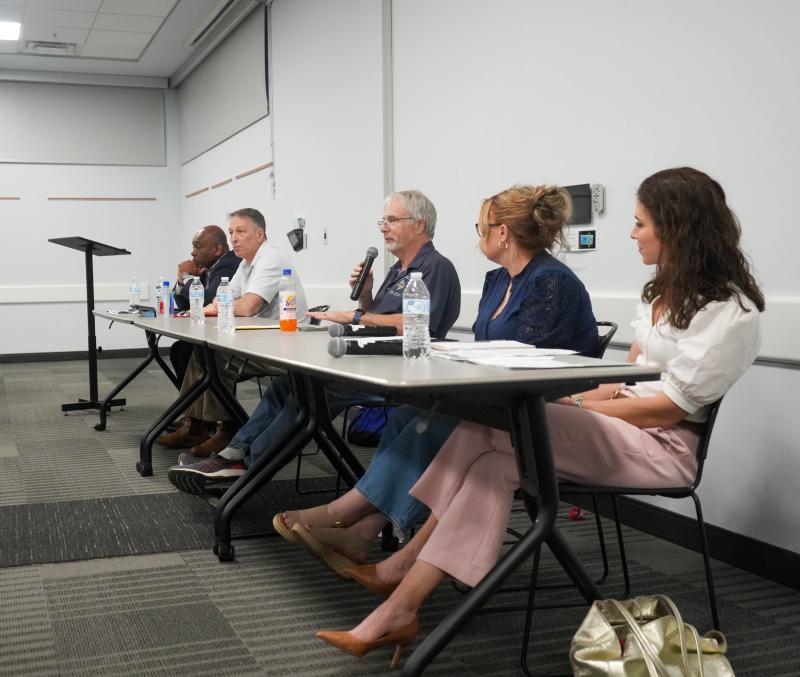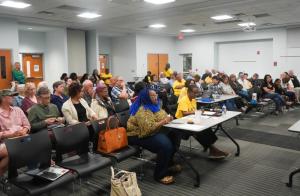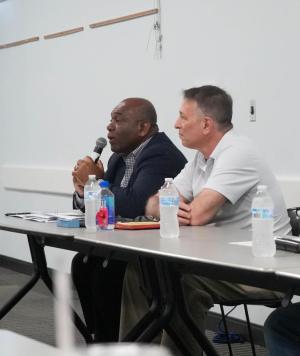Sunshine Circle Club holds Cape school board candidate forum

The Sunshine Circle Club hosted a forum for the Cape Henlopen School District Board of Education candidates April 29 at the Lewes Public Library.
Every candidate except Chris Lovenguth, who’s running for the at-large seat, attended the event. The other candidates are Bill Collick, who’s running against Lovenguth for the at-large seat; Andy Lewis, Patty Maull and Laura Parsons, who are vying for the District C seat; and Jason Bradley, who’s running unopposed for the District B seat.
Candidates were allowed two-minute introductions and were then given two minutes to answer each question, with a moderator present to enforce the time limits. Audience members had an opportunity in the second portion of the question-and-answer session to submit their own questions.
The questions covered a wide range of topics, including school safety; ICE members entering schools; the national education climate; Delaware House Bill 198 and the teaching of Black history; curriculum restrictions, book bans and censorship, especially relating to Black history and the LGBTQ+ community; bullying; the district’s national education standings; and what responsibilities the district should assume when dealing with societal issues like poverty, hunger and drug addiction.
The candidates were all on the same page about the importance of accurately teaching history, including Black history, and were all adamantly against censorship, book bans and curriculum restrictions related to the history of diverse populations and the LGBTQ+ community.
“If we prevent learning about other views, we’ll never be able to change the us-versus-them narrative,” Lewis said. “I have a problem with any organization, whether it be the federal government, the state government or anybody else coming in and telling us that we can’t teach the reality of history. If we stop teaching it, we’re going to repeat it.”
The other candidates agreed, echoing that Cape schools must continue to teach the history of diverse communities to foster informed, compassionate and empathetic students.
“If we don’t understand the past, there’s little hope for the future,” Parsons said.
Collick, who grew up attending segregated schools in the Cape district, said that diversity and inclusion are vital to student success. He recently spoke on a panel at an event called Integrating Lewes Public Schools, and earlier in the year, he helped present a Black history timeline from the Lewes Historical Society to students in Milton and Lewes.
The candidates were also all firmly opposed to ICE members entering Cape schools, something that’s been seen in recent months in other schools across the nation.
“For some of our students, school is the only safe place they have to go,” Maull said. “I do not approve of ICE coming in and interrupting our students’ lives.”
The other candidates echoed her answer, agreeing that there’s no place for ICE in Cape schools.
Concerning the current educational climate under the Trump administration, with the administration attempting to dismantle the federal Department of Education and taking away federal funding from districts and schools across the country, one audience member asked each candidate how they would compensate if Cape were to lose its federal grants and funding.
As Lewis pointed out, the majority of Cape’s funding – about 87% – comes from state and local sources, versus the other 13% coming from federal sources. Thus, while losing federal funding would certainly impact the district, he said, it wouldn’t be as severe as if the state were to cut its funding.
If there are federal cuts, Lewis said, the district will need to find other ways to compensate, like asking the state or its constituents for more money. Realistically, he said, while it would be great to keep every program and service that currently exists, the board and the community will likely have to make some sacrifices and determine which are the most critical and which could be cut in some way if necessary.
Maull said the district must hold the state accountable to ensure it minimizes the impact of any federal cuts on students. She spoke about how federal funding cuts not only affect the schools, but also other services and programs on which many students rely, such as food banks and the Court Appointed Special Advocates program.
For Parsons, it comes down to really leaning on community resources and collaboration with other local agencies, as well as working with local legislators to ensure students’ needs are met.
“We have a mission statement that’s contrary to the [federal] demands, and I do not believe that we will cave to them,” Collick answered firmly.
Indeed, Bradley said, the district prioritizes its students. While the uncertainty surrounding funding is concerning, he said, the district is trying to identify its financial priorities going forward and doing everything it can to prepare for the future.
Regarding societal issues like hunger, homelessness, poverty and drug addiction, Collick said that students are microcosms of society, meaning they’re experiencing these problems. He emphasized how important it is for the district to continue to provide its existing resources, like free or reduced-cost meals, school supplies, clothing, access to social workers and mental health counselors, and even emergency funds for hotel space for students in need.
While Lewis said it would be great if the district was able to help solve all of these issues, he said it just isn’t realistic because resources are not unlimited. Thus, he said, the district must make compromises as to what it can provide for its students.
Parsons and Maull said that while the district has limits and its primary goal is to educate, kids can’t effectively learn if they’re dealing with issues like hunger or poverty.
Parsons believes the district must be willing to ask for and accept the help it needs, collaborating with other social agencies, and leaning on community expertise and guidance. Recently, for example, she’s been working with community members to collect prom dresses for Cape High students who can’t afford them.
Every candidate acknowledged that growth, and funding to accommodate that growth, is the biggest challenge currently facing the district. Lewis and Maull agreed the district must improve how it communicates with the public to help build trust and to bridge gaps in community understanding about why exactly the district needs more funding to accommodate this growth.
Parsons said, besides district growth, another major issue is that students are finding ways around the current technological safeguards on school devices. She wants to examine the district’s technology policies to ensure students are safe, responsible and unable to access sexually explicit and/or violent content.
Ellen McIntyre is a reporter covering education and all things Dewey Beach. She graduated with a bachelor’s degree in journalism from Penn State - Schreyer Honors College in May 2024, then completed an internship writing for the Pittsburgh Post-Gazette. In 2023, she covered the Women’s World Cup in New Zealand as a freelancer for the Associated Press and saw her work published by outlets including The Washington Post and Fox Sports. Her variety of reporting experience covers crime and courts, investigations, politics and the arts. As a Hockessin, Delaware native, Ellen is happy to be back in her home state, though she enjoys traveling and learning about new cultures. She also loves live music, reading, hiking and spending time in nature.






















































